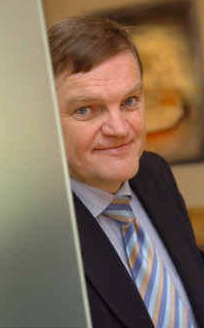"A law which makes people fight, I find horrific"
Interview with Belgian Member of Parliament Guy Swennen, President of the sub-committee for familielaw in the Belgian Commons
Translation to English by Peter Tromp (FatherCare Knowledge Centre Europe) from Belgian Newspaper The Standard; Interview with Guy Swennen, Editor Anja Otte;15 April 2006
 I am a very content person elected ", said Guy Swennen (SP.A: Belgian Socialist Party). You would do it for less. Each large project he takes on as a Member of Parliament, he seems to realise. After presumptive joint physical custody (presumptive hands-on bi-parenting), next week it is the turn to holebi-adoptions - allthough we will still have to wait how the Belgian Senate will vote on that.
I am a very content person elected ", said Guy Swennen (SP.A: Belgian Socialist Party). You would do it for less. Each large project he takes on as a Member of Parliament, he seems to realise. After presumptive joint physical custody (presumptive hands-on bi-parenting), next week it is the turn to holebi-adoptions - allthough we will still have to wait how the Belgian Senate will vote on that.
Guy Swennen, the man behind holebi-adoption (i.e. adoptive rights for homoís and lesbians) and presumptive joint physical custody (i.e. presumptive residential co-parenting or presumptive hands-on bi-parenting)
HE is neither hip nor sexy, but he is the hero of holebi's: Guy Swennen, floating strength behind the opening of adoption for to pair of the same line. And when Belgian Minister of Justice Laurette Onkelinx designs a law design concerning presumptive joint physical custody - the regulation where children spend equal time with their fatherís and their motherís - she also turns to Swennen for obtaining the mustard. He does not have a secret recipe for his efficiency. "It is simply within me", said Swennen.
You called the recently approved law on presumptive joint physical custody a milestone in familylaw. However there proves to be a lot of confusion and misfiring about it.
The rumour has spread that joint physical custody is now introduced as a linear rule. One thought that it be imposed. That is nonsense offcourse.Presumptive joint physical custody now became the legal focus point, as a technique to ensure a proper and correct treatment of the issue of the division of residence and housing.
This way you avoid that the issue can be swept aside just like that without proper grounds. We have a court in this region (Court of Tongeren.) where parents, who themselves had reached an agreement concerning this residence division arrangement, were sent into the woodworks by the court. That is the unbelievable reality of today. A lot of judges are fundamentally against joint physical custody, but that is now no longer enough to brush it aside. Also the refusal of one of the parents is no longer enough for sweeping it of the table.
Misunderstandings will allways be there with all laws which cannot be summarised in one sentense, but this law will be an essential development turn with beneficial influences. People will start reflecting differently from the start with regard to the residency arrangements and regulations that are to be made.
Children are burdened with many movings, is the criticism.
A child rather moves a time more, then that it must be missing one of its parents for a long time. Moreover in the traditional regulation, with visit in the weekend, it is frequently more often moved than in the weekly on and of regulation with both parents.
The new law in itself will bring about enormous mentality changes. When joint legal custody was previously introduced in the middle of the nineties, one has also struggled with that for a six-month period. But now in 98 per cent of divorces - also in the heavily contented divorces- the common exercise of parental authority goes agreed on.
Isn't the issue of non-respect for access arrangements and ambulatory regulations, as a result of which parents sometimes do not get to see their children for years, a much larger problem?
The law also contains a chapter about that. There now hangs an atmosphere with those who are unwilling to comply, that they are untouchables anyway. This law gives a powerful signal and indicator that this a particularly serious matter.
To start with a permanent possibility of court referral is now introduced in the law. This means that you can always call on the same judge rightly when courtordered access arrangements and ambulatory regulations are not observed and that the court is obliged to treat this matter with primacy and speed. That fast treatment is very important, because the longer it lasts that the children do not see one of the parents, the larger the chance is on parental alienation syndrome - parent alienation.
The new law now also registers the possibility of penalty payments. And in extreme cases the judge can order a child to be taken away by a bailiff. The judge will indicates whom should accompany the bailiff on his mission - either a psychologist, an expert, etc. - to reduce any traumatic impacts. That is also a very important step.
Original Dutch language Interview
 I am a very content person elected ", said Guy Swennen (SP.A: Belgian Socialist Party). You would do it for less. Each large project he takes on as a Member of Parliament, he seems to realise. After presumptive joint physical custody (presumptive hands-on bi-parenting), next week it is the turn to holebi-adoptions - allthough we will still have to wait how the Belgian Senate will vote on that.
I am a very content person elected ", said Guy Swennen (SP.A: Belgian Socialist Party). You would do it for less. Each large project he takes on as a Member of Parliament, he seems to realise. After presumptive joint physical custody (presumptive hands-on bi-parenting), next week it is the turn to holebi-adoptions - allthough we will still have to wait how the Belgian Senate will vote on that.